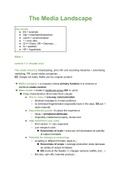The Media Landscape
Key words
● ES = example
● imp = important/importance
● comm = communication
● + = and, also
● CH = China, GR = Germany …
● Q = question
● HP = hypothesis
Week 1
Lecture 1 (+ chapter one)
The media industry: broadcasting, print, film and recording industries + advertising,
marketing, PR, social media companies …
ES: Google not really, Netflix yes (bc original content)
➔ Media company = a company whose primary function is to produce or
distribute media content.
➔ Mass media = media in traditional sense (ES: tv, print)
◆ 5 key characteristics (that make them unique)
● One to many = one-way communication
○ identical message to a mass audience
○ no individual fragmentation (especially back in the days, ES just 1
news channel)
● Experimental goods: it’s about the experience
○ Value = immaterial attributes
○ Originality, intellectual property, stories told
● High fixed/first copy costs
○ First version >> very expensive
○ Low marginal costs
◆ Economies of scale = price per unit decreases as quantity
of output increases
● Potential for (cheap) re-versioning:
○ re-selling in different formats, leads to ↓
◆ Economies of scope = average production costs decrease
as variety of output increases
◆ ES movie at the theatre >> cheaper versions (netflix, dvd…)
○ But also: spin-offs, branded products …
, ● High risk!
○ depends on consumer taste >> hard to predict
○ High first copy costs regardless # of consumers
◆ ES: “bomb” only a budgetary connotation
◆ for every media content (not only movies)
The mass media market
Dual-product market = media companies produce 2 things:
❏ Content >> sold to audience
❏ Audiences >> sold to advertisers
❏ Attention Economy: attention is the real product being sold/bought
❏ Result: advertising goals influence content/strategy
❏ Problematic for journalism, particularly: quality news outlet VS
scandalistic magazines (sell more ads = more money)
❏ Broader inherent tension
❏ creative industries VS commercial needs
❏ BUT… mass media market is changing
❏ for Hodkinson: digitalization / digital technologies are the biggest force
❏ 4 main outcomes of this change
Media organizations (at least some?) should be socially responsible.
A few core responsibilities (what we expect from media)
➔ Forum for exchange of ideas/opinions
➔ Integrative influence for diverse societies
➔ Protection of core values/vulnerable audiences
➔ Mostly for journalism, but also others?
Strong reactions to change
❖ McLuhan’s optimism:
➢ Technology itself matters (the medium is the message)
➢ New tech extends senses
, ➢ New (cool) media:
■ Audiences free from hierarchies, isolation
■ we have more power VS news to be published
■ Away from officialdom toward ‘everyday talk’
■ Toward a global village
❖ Postman’s pessimism:
➢ Print age: detailed, relevant, localized, coherent, rational
➢ Post-telegraph: dazzling stories from afar outweigh the relevant, local
➢ TV/images → superficiality
■ Attention and rationality decreased! BC now i can choose
whatever I want, but I can’t pay attention
■ Passive audience
❖ Critiques of the critiques
➢ Both: technological determinism
➢ technology itself = primary cause of social change
➢ simplifies & overplays tech, ignores social context
➢ ignores power relations behind development/use
■ Optimism: tech as solution to man-made problems
■ Pessimism: blames tech for social problems
➢ Problematic because…
❖ Du Gay’s et al. (1997): circuit of culture
➢ Tech’s significance best understood thru 5 processes:
■ Production: how/when/why was it developed?
■ Representation: how is it talked about?
■ Regulation: how is it controlled?
■ Consumption: how do we use it?
■ Identity: what does it say about us, when we use it?
SO …
● Media industry has shifting borders, definitions
● Its products, market structures are unique
● It’s undergoing massive changes
● Theorists react to those changes very strongly
○ And companies do, too
○ But, we are constantly engaging with it
■ Now... to the “media life” idea from Deuze (2011)
● Media now so central that we don’t notice them
● We don’t live with media, but in media
■ 2 clear manifestations:
● Personal/individualized information space
● Always-available global connectivity
, ■ 2 main consequences:
● Liquefied boundaries between work, play, alone, interaction
● Life changed to accommodate/exploit media
● + (Individualized togetherness)
■ Remember diversification, interactivity, mobility, convergence? >> All
reflected here
● Technological changes/responses create this new
individualized connectivity – more next week(s)
Summary
❏ Media industry, mass media, & market:
❏ Unique characteristics, fuzzy borders
❏ Social resp./creative-commercial tension unique
❏ Rise of digital media = further challenges, changes
❏ Systematically opposed responses to change
❏ “media life”: one approach to theorizing media
❏ Importance of “individualized info spaces”
❏ We saw (reinforced) individuality in your own habits
-
Article - Media Life (by Mark Deuze)
❖ Modern liquid society (Bauman)
➢ mediapolis: comprehensively mediated public space where media
penetrates all aspects of contemporary life
■ increasing invisibility of media BC unconsciousness when used
intensely
■ can’t see media habits BC they are a constitutive part of them
■ living in their own personal information space
➢ media NOT as somehow located outside of lived experience, but rather
AS intrinsically part of it.
■ our life is lived in, rather than with, media
■ we are living a media life
❖ Other theories: media ecology (McLuhan), mediatization >> aim to explore
how changes in society interact with trends in media
➢ BUT tend to confirm the traditional biases and boundaries of media
studies
❖ Denis McQuail: media are NOT crucial to everyday life and public communication BC of
their potential to reach an entire national or otherwise mass public with a restricted range of
content and experiences, but rather where their impact is premised on ‘the voluntary
engagement of the public in its own immersion in a rich and varied world of mediated
experience’





